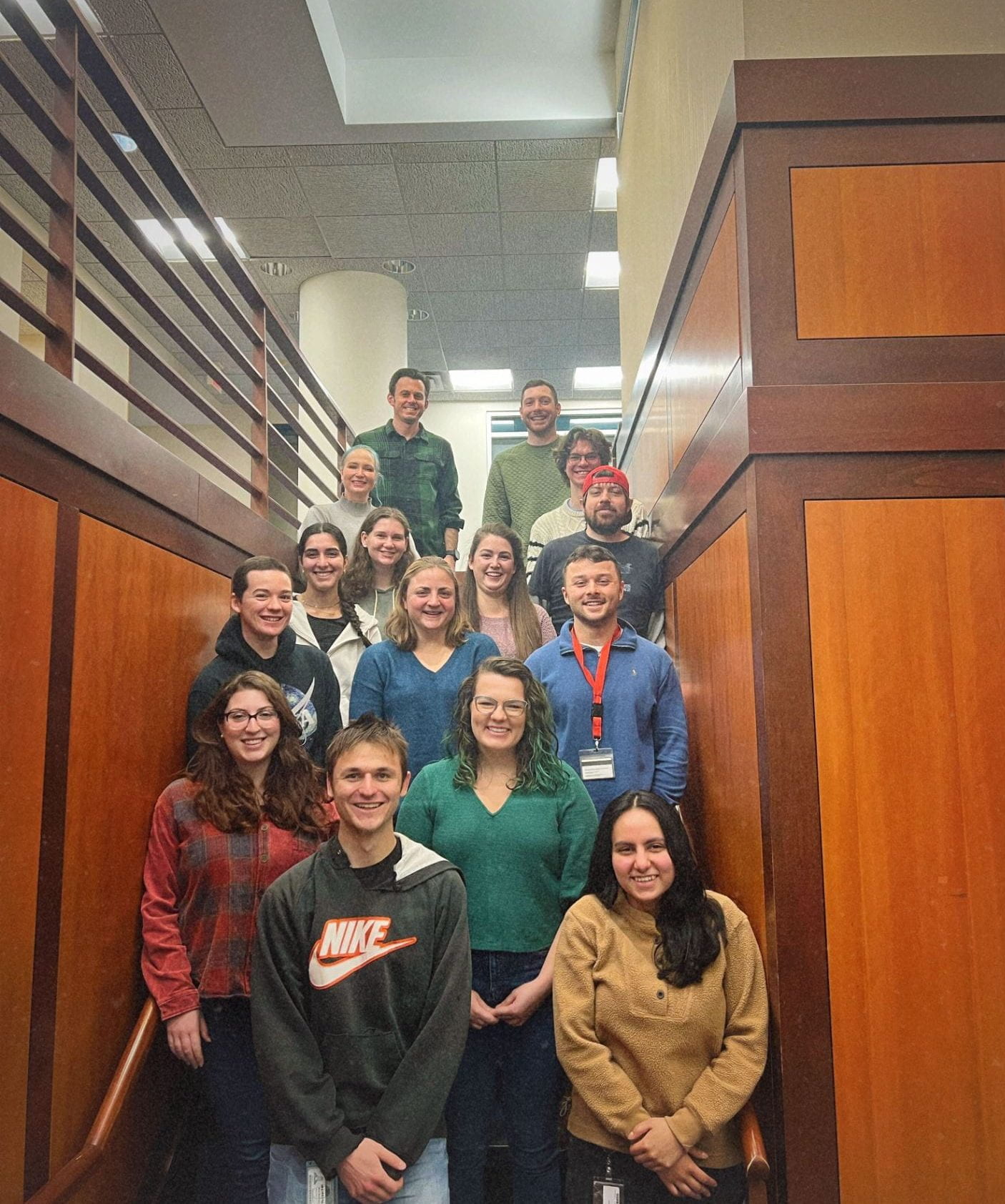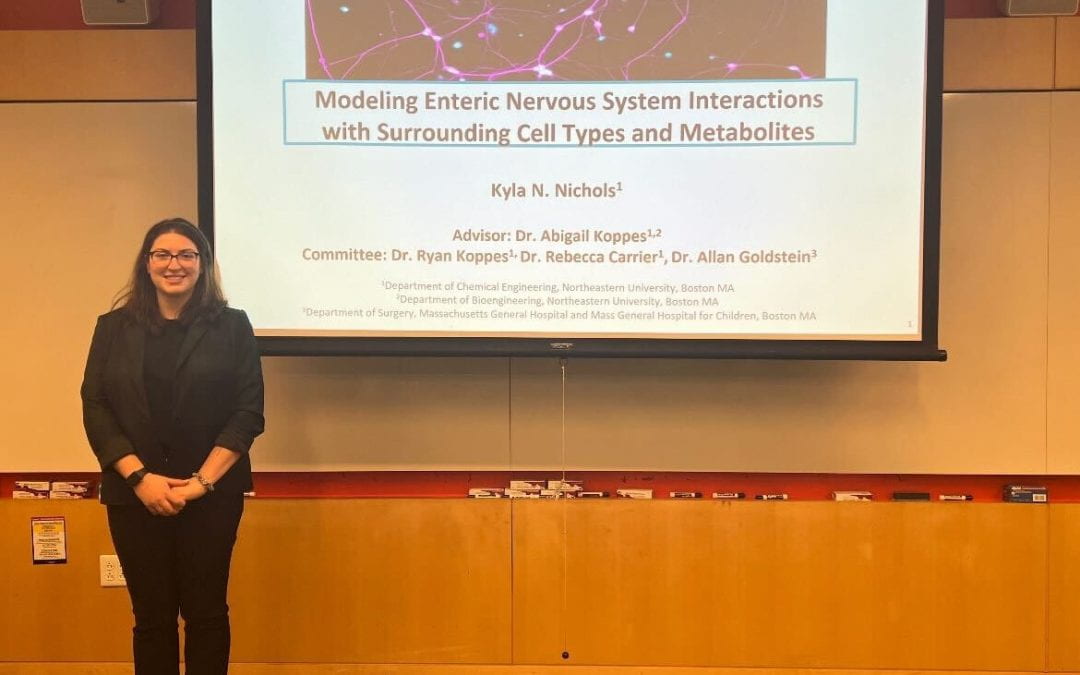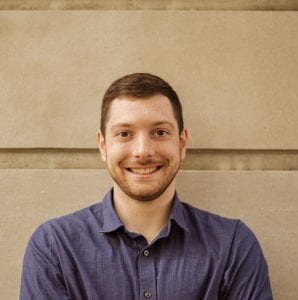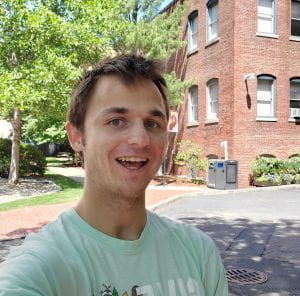Group Members

Principal Investigator
Dr. Abigail Koppes
Dr. Abigail Koppes joined the department of Chemical Engineering at Northeastern University in 2014 where her group, the Advanced Biosystems for Neuroengineering Laboratory (ABNEL), harnesses biochemical engineering methods to address challenges in nervous system disorders and dysfunction. She was the recipient of the NIH R21 Trailblazer in 2017, is a co-investigator on a 2019 AHA Innovative Project Award and is a co-investigator on a 2016 NIH Biomedical Research Partnership R01 between Northeastern, MIT, and Boston Children’s Hospital. She received the 2020 BMES Rita Shaffer Young Investigator and CMBE Young Innovator Award in 2020. She received her Ph.D. in Biomedical Engineering from Rensselaer Polytechnic Institute (RPI) in Troy, New York in 2013. Her doctoral research with Dr. Deanna Thompson focused on using electrical stimulation to manipulate neural and supportive glial cell behavior for improved repair following peripheral nervous system injuries. In 2013, Dr. Koppes joined the Advanced Drug Delivery Research Laboratory with Dr. Rebecca Carrier as the Northeastern University NSF ADVANCE Future Faculty Fellow and held a joint appointment at Schepen’s Eye Research Institute and Harvard Medical School with Dr. Michael Young and as a visiting scientist in Dr. Douglas Lauffenburger’s Molecular Cell Bioengineering group at MIT. At Northeastern Dr. Koppes enjoys teaching Design 1 Lab (Unit Operations Transport I) for undergraduate engineers and Design of Experiments and Ethical Research for graduate students, where she is a member of the DEI and graduate committees, as well as has mentored over 40 undergraduates in the laboratory. She also currently serves on the BMES Diversity Committee.
When not in the lab, Dr. Koppes enjoys cooking, travel, outdoor sports, and spending time with her husband and two Siberian huskies.
Ph.D. Biomedical Engineering
Rensselaer Polytechnic Institute (RPI)
Troy, NY
M.S. Biomedical Engineering
Rensselaer Polytechnic Institute (RPI)
Troy, NY
B.S. Biomedical Engineering
Rensselaer Polytechnic Institute (RPI)
Troy, NY
Google Scholar
 orcid.org/0000-0003-0433-9290
orcid.org/0000-0003-0433-9290
Graduate Students
Bryan Schellberg
Over the past 30 years, organ-on-a-chip devices have emerged as a robust alternative to address the technological gaps associated with current in vitro and in vivo options used to investigate biological questions. Organ-chip models integrate three-dimensional tissue architectures in vitro to recapitulate organ-specific functions, such as liver metabolism and intestinal barrier function. Although organ-chips are rapidly gaining interest, more work is needed to encourage broad adoption across research and industry. Bryan’s work focuses on the technical development of organ-chip devices for real-time monitoring and modulation of cell culture conditions with the goal of improving organ-chip functionality.
Bryan joined ABNEL in the Fall of 2021 as a Chemical Engineering PhD student. Before joining the lab, he graduated with a BS in Chemical Engineering from the University of Rochester in 2021. At his undergraduate institution, Bryan’s research focused on polymer science and new materials discovery. While at Rochester, Bryan participated in a summer NSF Research Experience for Undergraduates, which shifted his interest to biomedical research.
B.S. Chemical Engineering
University of Rochester ’21
Rochester, NY
Brent Buchinger
Parkinson’s disease is the second most common neurodegenerative disease, characterized by progressive losses in motor control and cognitive functioning. While recent work has hinted at a gut origin, research elucidating the mechanisms for this pathological pathway is lacking. Brent’s work aims to develop a novel microphysiological system mimicking the gut-brain axis with the goal of improving platforms for studying and understanding Parkinson’s disease.
Brent joined ABNEL in the summer of 2022 as a Chemical Engineering PhD student. Prior to his graduate studies at Northeastern University, Brent worked as an analytical chemist at Eurofins Food Integrity & Innovation. He obtained his BS in Chemical Engineering at the University of Wisconsin–Madison in December of 2019. At his undergraduate institution, Brent’s research focused on catalysis. However, his passions switched to biomedical engineering after researching chondrogenic differentiation at Case Western Reserve University in the summer of 2018.
B.S. Chemical Engineering
University of Wisconsin–Madison ’19
Madison, WI

Jessica Woolston
By age 45, around 20% of women and 10% of men are impacted by Alzheimer’s Disease, the primary cause of dementia. As of 2023, over 6 million Americans live with Alzheimer’s, a figure expected to nearly double by 2050. The economic burden is immense, with costs reaching $345 billion in 2023 and anticipated to soar to $1 trillion by 2050. The gut microbiome, comprising about 1,000 bacterial species, is a key research area, particularly for its role in neurodegenerative diseases like Alzheimer’s, although the complexity of its interactions is not fully understood. The significance of these bacteria in brain function is increasingly recognized, yet their precise functions and interactions remain largely uncharted. The complexity of the gut microbiome, possessing genetic material far exceeding that in the human genome, adds to the challenge of deciphering these interactions.
Jess Woolston, a PhD student at ABNEL, Northeastern University since September 2023, focuses her research on the microbiome-gut-brain axis and its influence on neurodegenerative diseases. Utilizing microfluidic organ-on-a-chip technology, she investigates the role of bacterial extracellular vesicles in these diseases, an approach pivotal for understanding the mechanisms of the microbiota-gut-brain axis in Alzheimer’s disease. Jess’s master’s thesis, which concentrated on the vaginal microbiome and bacterial vaginosis, refined her expertise in microbial analysis and laboratory practices. This formative period played a significant role in shaping her current research pursuits, particularly in her understanding of complex biological systems and their influence on human health.
M.S. Biomedical Sciences
Ghent University ’23
Ghent, Belgium
B.S. Biomedical Sciences
Ghent University ’21
Ghent, Belgium

La-Tonya Adams
The gastrointestinal (GI) tract is one of the most complex and sophisticated systems in the body. To balance its nutrient absorption function with immune tolerance, the GI tract requires a specialized structure, organization, and communication among a diverse array of cell types, a significant immune presence (comprising approximately 70% of the body’s immune system by weight), and a partially autonomous nervous system known as the enteric nervous system. Dysfunction in various aspects of GI homeostasis can lead to inflammatory bowel diseases (IBD) such as Crohn’s disease (CD) and ulcerative colitis (UC). Current treatment options have limited success in achieving lasting clinical remission or preventing potential intestinal fibrosis. Moreover, existing disease models often fail to predict drug efficacy and safety, highlighting the need for more translational options. Organ-on-chip in vitro models have demonstrated their potential as valuable tools for understanding cellular activity, replicating physiological conditions, and providing more translational results to clinical outcomes than traditional methods. Unfortunately, limitations related to cost and throughput hinder the widespread utilization of these platforms in drug screening paradigms. Tonya’s work focuses on developing a cost-effective multiplexed organ-on-chip system that models epithelial-immune-enteric nervous system interactions during inflammation.
Tonya joined LNNR & ABNEL in Fall 2023 as an Interdisciplinary Engineering PhD student with Merck. Her prior research has focused on cellular and molecular assay development for immunological disease indications. Prior to her graduate studies, Tonya completed her bachelor’s degree at Northeastern University and a master’s degree at Harvard Extension School. Her master’s research, conducted at Merck under the supervision of Dr. Denise Manfra, was titled “Reverse Translation and Extension of Human Tyk2 Biology to a Murine Model.” Throughout her career, Tonya has worked at Boston Children’s Hospital in the Nephrology Department/Transplantation Research Center, EMD Serono in the Immuno-Oncology department, and currently at Merck under Dr. Elisabeth Vollmann in the Discovery Immunology department.
M.A. Biotechnology
Harvard University – Harvard Extension School ’19
Cambridge, MA
B.S. Biology
Northeastern University ’08
Boston, MA

Valeria Ferre
Alzheimer’s disease (AD) is a neurodegenerative disorder affecting millions of people worldwide. Emerging evidence suggests that disruption of the blood-brain barrier (BBB), a network of cells that protects the brain from toxins, plays a role in AD onset and progression. Ongoing research is trying to understand how genetic and environmental factors influence BBB function, but the mechanisms underlying barrier disruption remain unclear.
Valeria focuses her research on developing a human BBB chip to study Alzheimer’s disease. She plans to grow iPSC-derived neurons with AD-relevant genotypes and incorporate them into multicellular BBB co-cultures. Using real-time sensing technology, she will investigate how genetic risk factors and environmental exposures affect BBB disruption and recovery, and evaluate potential protective interventions. Her work aims to better understand disease mechanisms in AD and develop a screening platform for potential therapeutics.
Valeria joined ABNEL in the fall of 2024 as a Bioengineering PhD student. Valeria is a 2024–25 ScholarSHPE recipient and an AJC STEM Fellow. She earned her B.S. in Biomedical Engineering from The University of Michigan in 2023, where her research focused on muscle stem cells and muscle regeneration. During this time, she also took a course in Tissue Engineering, which sparked her interest in organ-on-a-chip technologies and inspired her to pursue a PhD in this field.
B.S. Biomedical Engineering
University of Michigan ’23
Ann Arbor, MI

Eric Johnson
Eric joined ABNEL in the spring of 2025 as a Bioengineering PhD student. He earned his B.S. in Environmental Health Engineering from Carnegie Mellon University in 2024. During his undergrad, he worked in Dr. Abbott’s lab where his research focused on obesogens, chemicals suspected to disrupt adipose tissue development and contribute to obesity. Eric is continuing his research journey in ABNEL, investigating the serotonin-based signaling pathways between the gut microbiota and autonomic nervous system.
B.S. Environmental Health Engineering
Carnegie Mellon University ’24
Pittsburgh, PA
Undergraduates
Zachary Stolberg: Biochemistry, 2024
Mentor: Kyla Nichols
Christina Aniolek: Chemical Engineering and Biochemistry, 2025
Mentor: Bryan Schellberg
Hannah Carter: Bioengineering, 2025
Mentor: Ziwen Wang
Stephen Landry: Chemical Engineering, 2025
Mentor: Bryan Schellberg (ABNEL) and Selina Banerjee (LNNR)
Iris Chang: Cell and Molecular Biology, 2026
Mentor: Brent Buchinger
Julia Inayan: Bioengineering, 2026
Mentor: Bryan Schellberg (ABNEL) and Selina Banerjee (LNNR)
Dr. Ryan Koppes Presents at FluidicMEMS Meetup
Dr. Ryan Allen Koppes presented his lab's work at the FluidicMEMS Meetup this past Thursday. This event (held in the Samberg Center at MIT) was organized by FluidicMEMS, a dynamic community focused on bringing together individuals with a passion for microfluidics and...

Dr. Kyla Nichols Earns her PhD
Congratulations to Dr. Kyla Nichols for successfully defending her thesis. Kyla joined ABNEL back in the Fall of 2019, and she began her lab work just as the pandemic hit. However, despite this set back, she fully utilized her time in lab, investigating both the...




